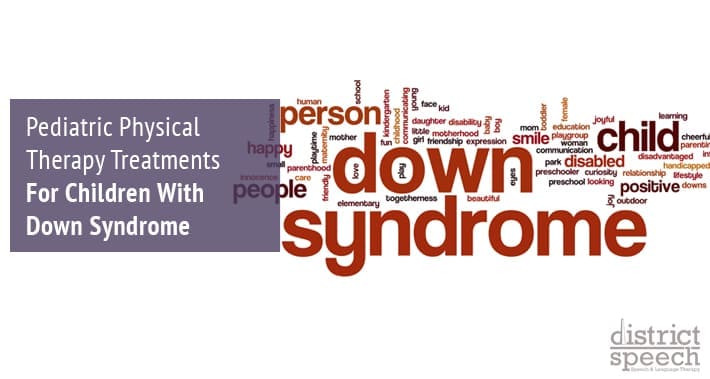
When a child is born with Down syndrome it can host a series of challenges for their family and future.
Seeking out support and aid early in your child’s development can make a world of difference in their quality of life.
As Down syndrome comes with many physical challenges, many health care professionals would suggest implementing the help of a pediatric physical therapist.
Last time we talked about speech therapy treatments for children with Down syndrome, but a pediatric physical therapist will be an important part of your team as well.
Feeling unsure about what your next steps are?
Read on to learn how a physical therapist can help your child’s overall quality of life.
What Is Down Syndrome?
When most babies are born, they have 46 chromosomes in total.
They’re organized into pairs – 23 pairs in total.
One half of each pair comes from each parent.
Chromosomes are thread like structures that carry the genes in your DNA.
Babies with Down syndrome, though, have an extra copy of their 21st chromosome.
The birth rate for Down syndrome is roughly 6000 per year in the US.
In pregnancy, your child’s chromosomes act like the blueprints for your child’s development in the womb.
The presence of an extra chromosome 21 can alter the development of your child’s body and brain, which can cause physical and intellectual challenges.
This can cause delays in your child with Down syndrome reaching developmental milestonesthat are important for speech development.
On average in the US, people born with Down syndrome tend to live to be approximately 60 years old.
While shorter than the average, this is a major improvement.
With the aid of physical therapists and other healthcare professionals, people with Down syndrome can have very fulfilling lives.
What Are The Physical Symptoms Of Down Syndrome?
Down syndrome is often detected before or at birth, through a few common physical characteristics.
These physical characteristics can include:
- An upward slant of the eyes
- A somewhat flattened facial profile causing href=”https://districtspeech.com/why-does-my-toddler-drool-so-much/”>excessive drooling
- Low muscle tone
- A singular deep crease across the palm of the hand
- Small head, ears, and mouth
Other commonalities between people born with Down syndrome are:
- The presence of a congenital heart disease
- Delayed motor skills development
- Challenges with vision and hearing
- Delayed language development
- A slowed development of complex movements, such as riding a bicycle or hula hooping
- Obesity
- Cognitive difficulties
- Learning and reading impairments
These commonalities can be difficult to recognize early on at birth.
In most cases, they become more obvious as your child grows.
What Does A Down Syndrome Pregnancy Feel Like?
A Down syndrome pregnancy often feels just the same as a normal pregnancy.
As a result, doctors usually diagnose it through a prenatal screening test.
In some cases, however, parents don’t realize their baby has down syndrome until they’re born.
What Causes Down Syndrome?
Down syndrome is caused by an extra copy of the 21st chromosome.
Why this happens, we don’t yet know.
However, we have found a correlation between how old you are when you give birth, and Down syndrome.
Parents who give birth over the age of 35 have an increased prevalence of babies with Down syndrome.
At the age of 20, parents have an incidence rate of 1 in 2000 for having a baby with Down syndrome, while parents at the age of 40 have an incidence rate of 1 in 100 childbirths.
However, because more people under 35 have babies overall, the majority of babies with Down syndrome are actually born to a parent under 35 years old.
At this time, researchers have found no definitive indication that Down syndrome is created from environmental factors or the parents’ activities during or before pregnancy.
Some studies have been looking into the link between high stress levels of parents at the time of conception, but that research is still in its early stages.
The additional 21st chromosome can come from either parent.

How Can A Physical Therapist Help Children With Down Syndrome?
People with Down syndrome may see additional physical challenges emerge later in their childhood and into their adulthood.
Some later in life challenges for those with Down syndrome may include:
- Diabetes
- Lower bone density
- Sleep apnea
- Trouble learning complex movements and tasks
- Skin disorders
- Early onset of dementia
- Thyroid dysfunction
- Hypertension and other cardiovascular issues
- Degenerative joint disease
- Depression
- Leukemia
A physical therapist works with your child, your family, and other health care providers to help lower the negative physical impact that Down syndrome can have on your child’s life.
In some cases, a physical therapist can help prevent associated conditions from even developing.
By pairing up with a physical therapist your child can put their best foot forward.
A physical therapist will work with your child to help them gain strength and advance their movement skills so they can best function in their day to day lives.
More specifically, a physical therapist will work with your child to improve their balance, coordination, muscle strength, and movement skills.
By gaining these skills, your child with Down syndrome can increase their quality of life and independence.
Early intervention by a pediatric physical therapist can help a child with Down syndrome develop to their maximum potential.
When you first see your pediatric physical therapist, they’ll take the time to assess your child, with the idea of gaining a better understanding of their issues.
This will include:
- A general health history
- Physical exam
- Muscle tone
- Movement patterns
- Height and weight
- Motor skills
- Vision
- articulation of words
- Developmental milestones they’ve reached (or not reached)
- Any concerns you may have as a caregiver
From there, your pediatric physical therapist will provide you with a treatment plan.
Every child is unique, so after a screening your physical therapist will create a treatment plan designed to help your child where they need it most.
Most of the time, your plan will include working alongside a pediatric speech therapist.
Pediatric speech therapy for down syndrome has a lot to offer your child as well.
Here are some of the elements you might find in your treatment plan.
1. Developing Physical Strength
Your pediatric physical therapist will teach your child movements and exercises to help increase their physical strength.
One exercise they may work on with your child is learning how to walk.
They’ll work with your child to find games and tasks that will improve their muscle strength.
When working with children, it’s important to make these exercises challenging and fun.
It is also important that these exercises are safe.
You can baby proof your home while your child with down syndrome is learning to walk to maintain this safe space.
As your child grows and their interests change, your physical therapist’s plan will grow along with them.
This flexibility ensures that their fitness and health plan is as effective as possible.
Obesity is a common condition amongst children with Down syndrome, so keeping active is an important facet of your child’s health.
2. Developing Locomotive Skills
Your physical therapist will guide your child to learn and master their gross motor skills like walking, standing, crawling, and pulling themselves from sitting to standing.
They may offer your child hands on training for play, movement, feeding, and positions.
Your pediatric physical therapist may also make suggestions on how your home can be as communicative and encouraging as possible for your child’s development.
Equipment like treadmills and balance balls are popular tools used among pediatric physical therapists who work with children to develop their locomotive skills.
Skipping, jumping, and even dribbling a ball may also make their way into your child’s pediatric physical therapy routine.
3. Improving Balance
Exercise and play are important in a child’s development.
Your pediatric physical therapist will use exercise and play to work on improving your child’s postural control, coordination and balance.
They might use a firm round pillow to help your child in developing their balance abilities.
Achieving a core balance is a blend of strengthening your child’s muscles and working on their physical awareness.
It can also reduce their risk of accidents.
4. Maintaining Physical Fitness
By assessing your child’s needs and limitations, your pediatric physical therapist can craft a fitness regimen that’s both fun and beneficial.
Keeping active and healthy can greatly reduce further complications associated with Down syndrome.
For new parents who have no experience with Down syndrome, a pediatric physical therapist can be a wealth of knowledge and a source of guidance in your child’s journey.
They can help craft a healthy diet and even weave community involvement in your child’s health.
By making fitness fun and even social, staying fit isn’t so much of a chore.
This can help them to live more independently.
Book Your Appointment With District Speech Today
If you have a child with Down syndrome, it can be an overwhelming diagnosis.
You’ll have so many questions about your child’s condition, and their prospects for the future.
However, you’re not alone.
Thanks to modern advances in treatments for Down syndrome, many can go on to enjoy happy, fulfilling lives.
If your child has been diagnosed with Down syndrome, we’re here to help.
Book your appointment with District Speech today.
1300 I St NW, Suite 400 E,
Washington, DC 20005
- https://g.page/districtspeech
District Speech and Language Therapy specializes in speech therapy, physical therapy, and occupational therapy solutions, for both children and adults, in the Washington D.C and the Arlington Virginia areas.